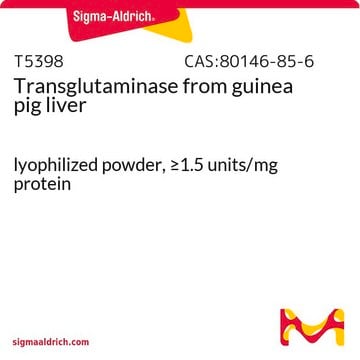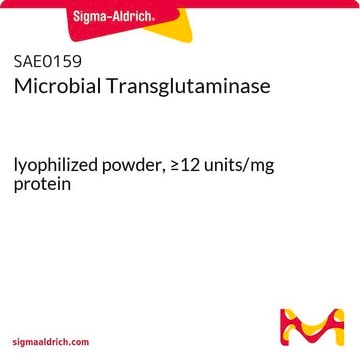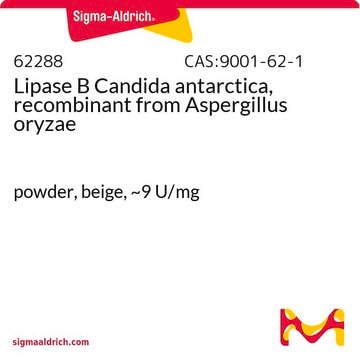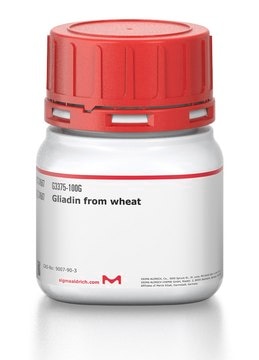T0581
Transglutaminase from guinea pig liver
≥1.5 units/mg protein, recombinant, expressed in E. coli
Sinônimo(s):
TGase
Faça loginpara ver os preços organizacionais e de contrato
About This Item
Produtos recomendados
recombinante
expressed in E. coli
Nível de qualidade
atividade específica
≥1.5 units/mg protein
Condições de expedição
dry ice
temperatura de armazenamento
−20°C
Aplicação
10 mM calcium chloride is used for activation of the enzyme.
Transglutaminase has been used in a study to improve quantifiable assays to fully characterize the role of transglutaminase in diseases such as Huntington′s disease and Alzheimer′s disease.Transglutaminase has also been used in a study to develop a nonradioactive dot blot assay for transglutaminase activity.
Definição da unidade
One unit will catalyze the formation of 1.0 μmole of hydroxamate per minute from Nα-Z-Gln-Gly and hydroxylamine at pH 6.0 at 37 °C. (L-Glutamic acid γ-monohydroxamate is the standard.)
forma física
Lyophilized from 10 mM NaH2PO4, 150 mM NaCl, pH 8. Contains maltodextrin.
Palavra indicadora
Warning
Frases de perigo
Declarações de precaução
Classificações de perigo
Eye Irrit. 2
Código de classe de armazenamento
11 - Combustible Solids
Classe de risco de água (WGK)
WGK 3
Ponto de fulgor (°F)
Not applicable
Ponto de fulgor (°C)
Not applicable
Certificados de análise (COA)
Busque Certificados de análise (COA) digitando o Número do Lote do produto. Os números de lote e remessa podem ser encontrados no rótulo de um produto após a palavra “Lot” ou “Batch”.
Já possui este produto?
Encontre a documentação dos produtos que você adquiriu recentemente na biblioteca de documentos.
Os clientes também visualizaram
Acyl-CoA esters of xenobiotic carboxylic acids as biochemically active intermediates.
H S Sherratt
Biochemical Society transactions, 13(5), 856-858 (1985-10-01)
S Kølvraa et al.
Biochemical medicine and metabolic biology, 36(1), 98-105 (1986-08-01)
Prompted by the fact that the urinary excretion of organic acids in the riboflavin-deficient rat closely mimics that found in patients with inborn errors in the acyl-CoA dehydrogenation systems, the organelle localization and the apparent kinetic constants (Km and Vmax
K D MacDermot et al.
Developmental pharmacology and therapeutics, 3(3), 150-159 (1981-01-01)
We report investigations of benzoate and glycine metabolism and glycine acyltransferase activity in rats. These studies provide insights related to the therapy and pathophysiology of human nonketotic hyperglycinemia. Liver acyltransferase activity increased sharply postnatally from low levels at birth, but
M Kelley et al.
Journal of biochemical toxicology, 5(2), 125-135 (1990-01-01)
The aralkyl-CoA:glycine N-acyltransferase and the arylacetyl-CoA:amino acid of N-acyltransferase were purified from bovine liver mitochondria and their response to a variety of ions investigated. The activity of the aralkyl transferase was inhibited by divalent cations with all substrates investigated. For
C M Becker et al.
Archives of biochemistry and biophysics, 223(2), 381-392 (1983-06-01)
Valproic acid (dipropylacetic acid), an antiepileptic agent known to be hepatotoxic in some patients, caused inhibition of lactate gluconeogenesis, fatty acid oxidation, and fatty acid synthesis by isolated hepatocytes. The latter process was the most sensitive to valproic acid, 50%
Nossa equipe de cientistas tem experiência em todas as áreas de pesquisa, incluindo Life Sciences, ciência de materiais, síntese química, cromatografia, química analítica e muitas outras.
Entre em contato com a assistência técnica











